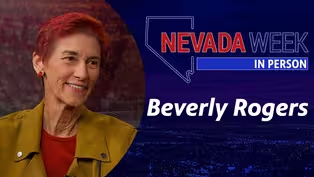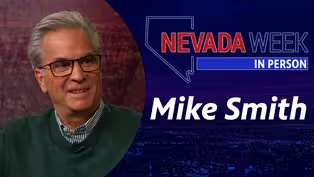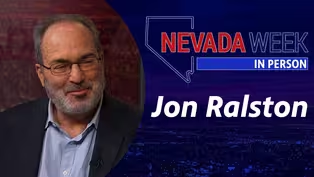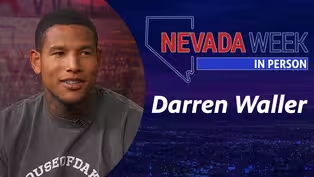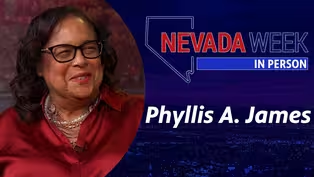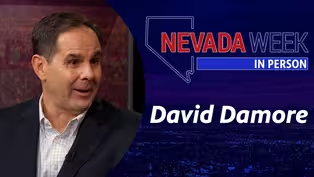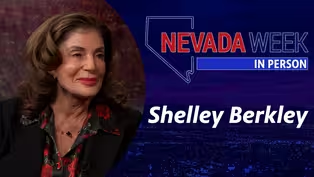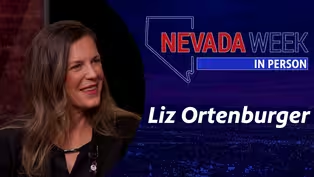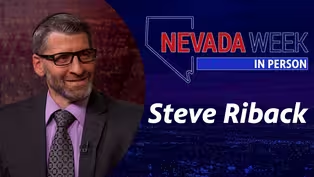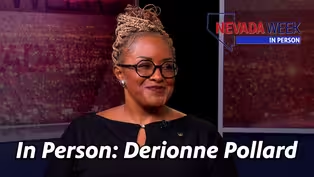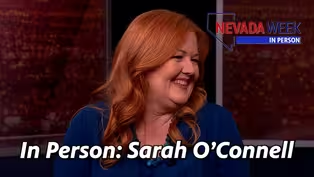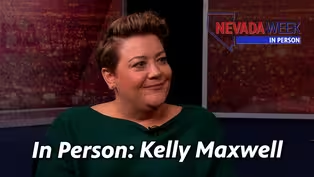
Nevada Week In Person | Terry Fator
Season 1 Episode 17 | 14mVideo has Closed Captions
We talk one-on-one with Strip headliner Terry Fator.
We talk one-on-one with Strip headliner Terry Fator.
Problems playing video? | Closed Captioning Feedback
Problems playing video? | Closed Captioning Feedback
Nevada Week In Person is a local public television program presented by Vegas PBS

Nevada Week In Person | Terry Fator
Season 1 Episode 17 | 14mVideo has Closed Captions
We talk one-on-one with Strip headliner Terry Fator.
Problems playing video? | Closed Captioning Feedback
How to Watch Nevada Week In Person
Nevada Week In Person is available to stream on pbs.org and the free PBS App, available on iPhone, Apple TV, Android TV, Android smartphones, Amazon Fire TV, Amazon Fire Tablet, Roku, Samsung Smart TV, and Vizio.
Providing Support for PBS.org
Learn Moreabout PBS online sponsorshipMore from This Collection
Nevada Week In Person goes beyond the roundtable discussion of Nevada Week with guests for a more casual conversation about their personal passions, new projects and compelling stories that are overlooked in the flurry of the news cycle.
Nevada Week In Person | Beverly Rogers
Video has Closed Captions
One-on-one interview with Rogers Foundation chair Beverly Rogers. (14m)
Nevada Week In Person | Mike Smith
Video has Closed Captions
One-on-one interview with Las Vegas Sun political cartoonist Mike Smith. (14m)
Nevada Week In Person | Jon Ralston
Video has Closed Captions
One-on-one interview with The Nevada Independent CEO Jon Ralston. (14m)
Nevada Week In Person | Darren Waller
Video has Closed Captions
One-on-one interview with Las Vegas Raider tight end Darren Waller. (14m)
Nevada Week In Person | Phyllis A. James
Video has Closed Captions
One-on-one interview Phyllis A. James. (14m)
Nevada Week In Person | David Damore
Video has Closed Captions
One-on-one interview with Chair of the Department of Political Science at UNLV David Damor (14m)
Nevada Week In Person | Shelley Berkley
Video has Closed Captions
One-on-one interview Senior Vice President for Touro University Shelley Berkley. (14m)
Nevada Week In Person | Liz Ortenburger
Video has Closed Captions
One-on-one interview with SafeNest CEO Liz Ortenburger. (14m)
Nevada Week In Person | Steve Riback
Video has Closed Captions
One-on-one interview with Las Vegas Metro Police Lieutenant Steve Riback. (14m)
Nevada Week In Person | DeRionne Pollard
Video has Closed Captions
One-on-one interview Nevada State College President DeRionne Pollard. (14m)
Nevada Week In Person | Sarah O’Connell
Video has Closed Captions
One-on-one interview with Director of Eat More Art LLC Sarah O’Connell. (14m)
Nevada Week In Person | Kelly Maxwell
Video has Closed Captions
One-on-one interview with Baby’s Bounty Executive Director Kelly Maxwell. (14m)
Providing Support for PBS.org
Learn Moreabout PBS online sponsorshipHe became a household name when he won America's Got Talent in 2007, and now he's one of the top draws on the Las Vegas Strip.
Terry Fator and a friend join us this week for Nevada Week In Person.
♪♪♪ Support for Nevada Week In Person is provided by Senator William H. Hernstadt and additional supporting sponsors.
(Amber Renee Dixon) Terry Fator brought a unique mix to Las Vegas, delighting crowds of all ages when he arrived here more than 10 years ago.
His show features ventriloquism, impressions and music.
Terry Fator, welcome to Nevada Week In Person, and please introduce us to your guest.
-I'm Terry.
-And I'm Winston, the impersonating turtle.
I'm actually the talent in the show.
-That's true.
-Winston loves Garth Brooks; is that correct?
-I can do impressions of any singer.
-How did you come to have so many talents?
-Well, I was born that way.
(laughter) Actually, the truth is that Winston, I was doing a Kermit the Frog puppet, and when I was on America's Got Talent, I asked them if I could use Kermit the Frog and the Muppets did not give me permission.
They said I could do the voice, but I could not use the puppet.
So I was trying to-- -And I'm wondering-- -Yes.
I was trying to find someone, and I met this little guy.
And what did you do?
-I said hi-ho, Kermit the Frog here.
-Right.
-Why are you better than Kermit the Frog in your opinion?
-Oh, because I'm a turtle.
We have a hard shell; we're kind of like M&Ms.
-And I really like the bowtie too.
You guys go very well together.
-Thank you.
-Interesting interview to conduct here because it's with both of you.
But I want to talk about you, and obviously Winston knows you very well so chime in whenever.
I want to say happy belated Valentine's Day to you, and I bring that up because it has a significance in your personal history that day.
What is it?
(Terry Fator) Well I mean, I finally found true love.
I mean, who doesn't want to find true love?
It's very difficult when you've had some trouble in romantic relationships in the past and then finally in 2015, I met the love of my life.
We met in April and were married four months later, and we are just so happy.
So I love celebrating Valentine's Day because well, she's just my love and my life.
I love her.
-That's a different answer than I was expecting, though.
-Really?
Okay.
-Yes, because I thought it was Valentine's Day when you had some sort of book report... -Oh, you're right.
See, I'd say I didn't know.
I was just thinking of my wife but of course, why wouldn't I, right?
No, you're right.
You're right.
You're absolutely right.
Valentine's Day-- -Can I tell the story?
-No, let me tell it.
-Okay.
Sorry.
-Don't hang your head.
-Okay.
Okay.
-So now, I was supposed to do a book report on Valentine's Day and back in the old days when-- as you know I'm 56 years old, so back in 1975 we had card catalogs that were actual cards.
We didn't have all this digital stuff.
So I was supposed to do Valentine's Day, and I flipped a little too far and found a book on ventriloquism.
And I got to be honest, I completely forgot about the Valentine's.
I was supposed to do a book report on it, and I forgot all about Valentine's Day and picked up ventriloquism.
So it did-- it was very impactful.
But I'm glad I got to mention my wife Angie.
-I am too.
Fast forward-- and I have written down 30 is the new 40, or 40 is the new 30; I got that backwards.
So 40 years old is when everything kind of came together for you.
How so?
-Well, it came together in an interesting way for me because I always assumed-- in fact, I did an interview when I was 10, right after I became a ventriloquist, and they said what do you want to be when you grow up?
I said I want to be rich and famous.
So even at 10 I knew I wanted to be an entertainer, so I just always assumed it was going to happen because I knew I was talented.
Then when I hit 40 I started assessing my life and I was doing professional ventriloquism all over the country.
I was playing schools and fairs, and at 40 I kind of thought you know, I think this ship has sailed.
I doubt there's ever going to be any place for a 40-year-old ventriloquist to get rich and famous.
And then two years later, America's Got Talent changed all of it.
But the funny thing is it wasn't like a depressing thing.
It was more like oh, I guess I'll just have to accept that this is my life, that I'm never going to get rich and famous.
But I was really grateful for the fact that I was one of the lucky people that got to do what I love and make a living at it.
You know, I was performing at small venues and doing county fairs and elementary schools, but I thought jeez, it's much better than having to go into an office every day.
You know, I'm not the office type.
I'm really not.
-When was it that-- do you think it was when you realized okay, I may not be rich and famous and you let that go and then things started to click?
-Yes, which is how it tends to work, isn't it?
A lot of times when you're focusing on something-- well for example, a lot of times in romance, this is exactly what happened with my wife Angie.
I mean, I had given up and I said you know what?
I'm done.
I'm so done with all this.
I'm done with romance.
I'm done with women.
And it wasn't a month later that I met the love of my life.
But the same thing.
You know, I had given up on ever really being rich and famous or even famous.
You know, I just wanted to have a fan base.
And then everything changed.
So I think a lot of times the pressure that we put on ourselves for something might change.
-Exactly.
You have been living with attention deficit disorder your entire life.
We hear about it with children.
What's it like as an adult, different?
-It's different, but it's not-- I don't really consider it a disability.
I use it to my-- -Trust me, he definitely has ADHD.
-Yes, I do.
-How do you recognize it?
-Oh, just the way-- you know, sometimes his hand is shaking and he's like... -That's not true.
So what happens is my mind works way faster-- my brain works way faster than my mouth.
So a lot of the times when I'm having a conversation with someone, I'm already five thoughts ahead and that's definitely ADHD.
And my poor wife, it drives her crazy because I can't work without something else on.
So I like to have a television on or I have to have music in the background, and I don't even notice the TV and I don't notice-- but it's a way of kind of skewering that my brain just works at such a crazy speed.
So when I'm doing this-- but also if you watch my show, I'm doing about ten things at a time, and I'm doing it flawlessly and I'm doing it smoothly, and you really don't notice it.
-Yeah, like the fact that I'm looking at you and looking at him.
-But see, that's just a lot of practice.
-Yeah, thousands of hours.
Thank goodness I wasn't there for that.
-No, you weren't.
So I really kind of took that, and instead of looking at it as something bad, I turned it into a strength.
But it's very difficult, and I never did take medication for it because I just always felt like I don't want to dull that part of me.
I want to be able to-- I do several things at a time, and then other times I get distracted and I can't focus but, you know, it's part of having ADHD.
-Perhaps the puppets are the medication.
Is "puppets" the correct term?
-Yes.
Actually, Mannequin American.
(laughter) Mannequin American.
Is that yours?
-No.
Actually, that was written by Dan Horn.
-Yes, a good friend of mine is a ventriloquist, and he gave me that joke.
-Well, we would like to be politically correct.
-That's right.
No, puppets is fine.
-We're puppets.
We don't have feelings.
-Exactly.
-You are almost a year into your new show at the New York, New York, "Who's the Dummy Now," and you said, you've been quoted as saying it's a little bit different than what you've done in the past.
Quote, "It's kind of a whimsical "origin story, delving into "the psychiatry of a ventriloquist," and that's what I would like you to expand upon.
I mean, who are these puppets to you?
-Well, as I was assessing what I wanted my next show to be after I moved from the Mirage over to New York, New York, I thought it might be kind of fun to look at the psychological aspect of what a ventriloquist is.
I started looking at all my characters and realizing that all of those characters were kind of created out of my psyche.
And I realized like Winston-- -I'm his inner child.
-Right.
So he gets to be the little kid that-- -Sometimes I'm a little confused.
-Yeah.
Like for example I'll say do you like it in Vegas?
-Oh, yeah.
They're so nice.
Just for me, they made turtle soup.
-Right.
So he doesn't understand what turtle soup is.
He thinks it was an honor, you know, and little things like that.
But he's the childlikeness.
You know, I have a country singer who's been divorced 10 times or 12 times.
Well, I've had two divorces, so I created a puppet that's had more divorces than me.
You know, I've got a sexy puppet.
I've never considered myself sexy, but it's kind of that-- you know, any guy wants to be considered sexy, and I've never thought of myself as sexy so what did I do?
I created the sexiest puppet ever.
So as I began to look at the different characters that I'd created, I realized I was doing this out of my psyche, and I think a lot of-- well, I think the best ventriloquists do that.
I think the best ventriloquists pick part of themselves and turn it into a character.
-Wait, you don't think women find you sexy?
-Well, my wife does and that's really all that matters.
I have never thought of myself as sexy, but she makes sure I know that.
-I don't think he's sexy.
-Well, I hope you don't.
-Yeah.
Considering where his hand is, he's right.
(laughter) You brought up a ventriloquist.
I think that's something important to you, you like to acknowledge those who have come before you, and what do you think the public perception of ventriloquism is?
You got to protect it, right?
-It ebbs and flows.
There are times when ventriloquism is considered valid entertainment for all ages, you know.
Edgar Bergen back in the 1930s, he had a-- I think it was 20 or 30 years he had a radio show.
Then you had other ventriloquists that came along and were more children's entertainers, and then you had Soap with Jay Johnson, who was definitely an adult entertainer.
So by the time I went on America's Got Talent, we were in one of the ebbs or the flows where everyone thought ventriloquism is just for kids, and I wanted to be one of the ones who changed that perception.
Not that my show is dirty, it's not, but my show is written for the adult intellect.
So my jokes are well thought out and are clever.
-A lot of ventriloquists are corny.
-Right, and Terry's not; Terry's not corny.
-No.
Unsolicited, Terry's not corny.
-Right.
-You forgot who just said that, right?
-I'm not corny.
-But I imagine some of your jokes might go over your head.
-Oh, definitely; in fact, all of them do.
-Because you are childlike.
-Yeah.
Well, I'm a turtle too.
-You keep bringing up your wife.
Does Winston have a romantic interest?
-Well, yes.
There's a lady that I'm interested in, and her name is Tiffany.
-Tiffany.
-Yes, a turtle, a lady turtle.
-Tiffany the turtle.
And does she live in Las Vegas?
-She does.
-And it's not working out or what?
-Well, I'm still trying.
-Okay, all right.
Well, best of luck to you.
I like in one of your interviews you said, "The minute there is something stupid "in the room that you can agree on, "comment on it."
-Yes, that's absolutely true and that's really-- but I think that's what all-- I mean, not ventriloquists but all comedians do.
Anytime something doesn't make sense, we always try to find the humor in it which is what makes it so difficult in a woke society because, you know, comedians, we think outside the box and sometimes if you want to be funny, sometimes you're going to say something that might be offensive.
It really makes it difficult to be funny and be a comedian when people are so-- they wear their feelings outside.
-Comedy used to be off limits.
-Exactly, and I think it should be.
I think we need to go back to comedy being off limits.
-A couple rapid fire because we are running out of time.
-I'm ready.
-A true Las Vegas experience is... -Okay.
What do you think-- let me see.
I wrote some notes.
Okay.
-No one knows.
They're always too drunk to remember.
-No, really?
You think so?
I think the true Las Vegas experience, and this is what I used to do, is breakfast at 4 a.m. after going to see a couple of shows with your friends and, you know, going out and gambling and having fun.
That's the Las Vegas experience, don't you think?
-And like steak and eggs for maybe seven bucks, something like that.
- I like ham and eggs, though.
-Nevada's most important asset.
-Oh, that's right.
Oh, what is Nevada's-- -A turtle who can do impressions, duh.
-Well, what was I thinking.
-I would say the sense of community.
We have a really great sense of community here in Vegas, don't you think?
-Do you feel that?
-I do.
I really do.
You know, when we came together after the shooting in October a few years ago, and every Christmas when we have the toy drive, we have one of the best toy drives in the country.
I love it.
It's great.
-Terry Fator, thank you so much for your time.
You can catch Terry's show, "Who's the Dummy Now" at New York, New York along with Winston.
And you can watch the latest episode of Nevada Week anytime online at vegaspbs.org/nevadaweek or tune in Sunday at 5:30 or Tuesday at 7:30.
Did you get those times?
Thank you for joining us.
♪♪♪

- News and Public Affairs

Top journalists deliver compelling original analysis of the hour's headlines.

- News and Public Affairs

FRONTLINE is investigative journalism that questions, explains and changes our world.












Support for PBS provided by:
Nevada Week In Person is a local public television program presented by Vegas PBS
